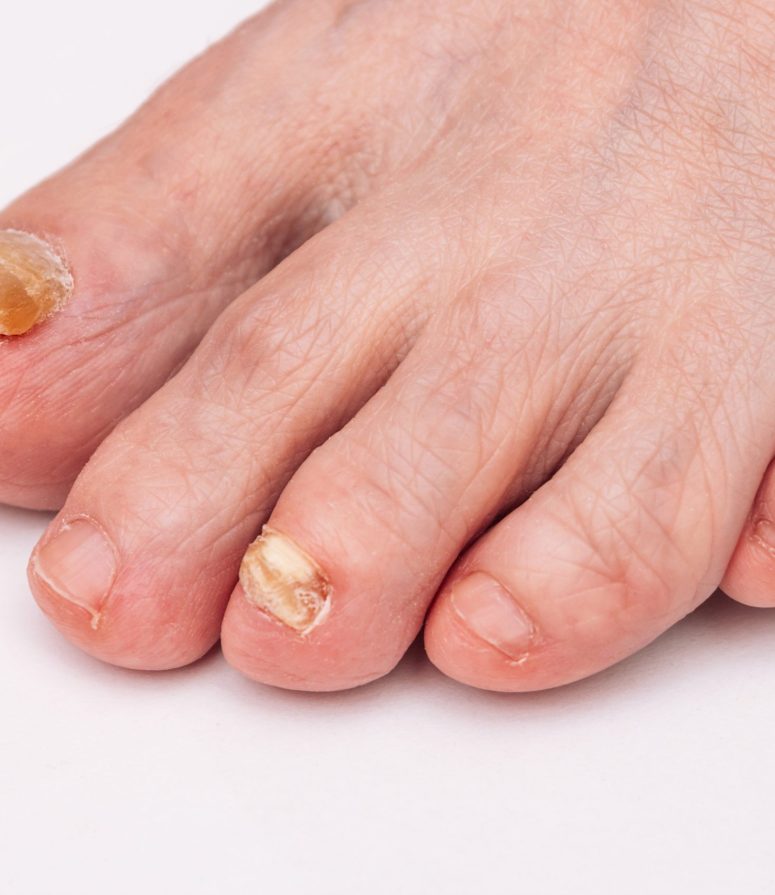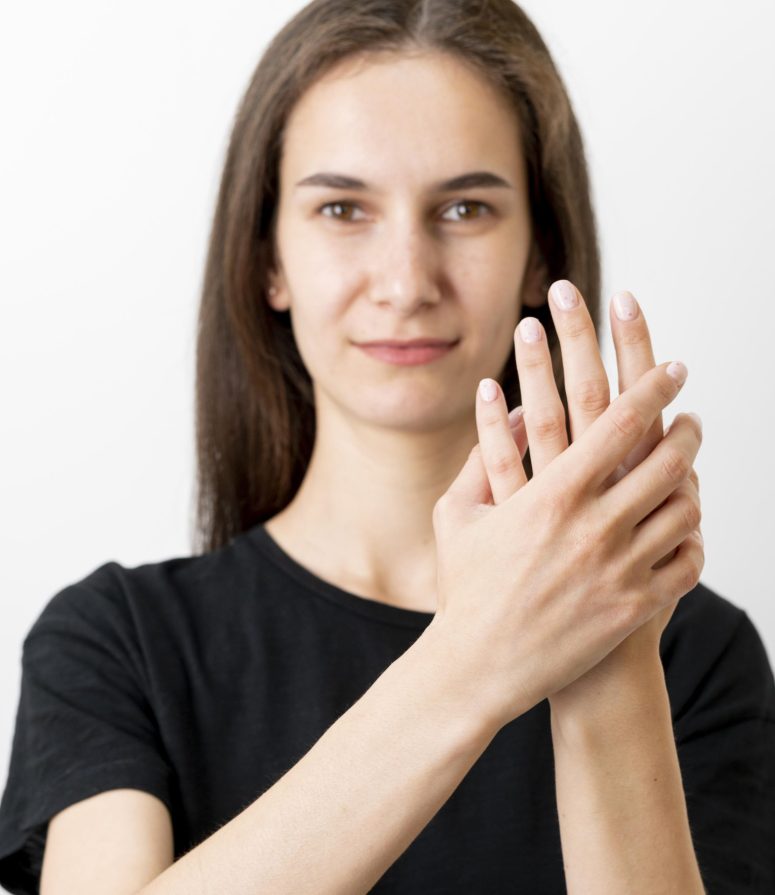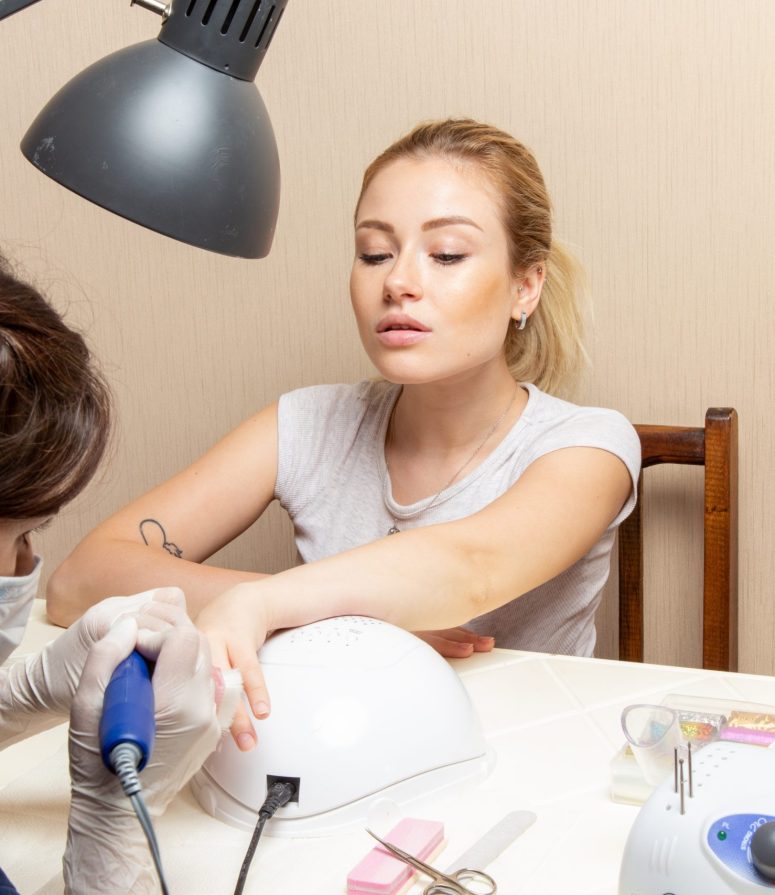Nail Psoriasis Treatment in Venice, FL
Changes in the appearance or texture of your nails can indicate something more than just a fungal infection or an injury, especially if you have psoriasis. Up to 55% of people with psoriasis have psoriatic nail disease, also known as nail psoriasis. It can also occur in individuals with no previous diagnosis of psoriasis, although this is somewhat rare. It’s important to understand that the health of your nails might have a connection to other forms of psoriasis, and also what nail psoriasis treatment is the best choice for you.
For Nail Psoriasis Treatment In Venice, FL, Contact Us

What is Nail Psoriasis?
Nail psoriasis is a condition that causes changes to the nails, affecting both the fingers and toenails.
Symptoms of psoriasis in the nails include:
‣ Pitting
‣ Crumbling
‣ Blood under the nail
‣ Build-up of cells under the nail and the oil drop sign
‣ Discoloration
‣ Thickening
‣ Separation
‣ Crumbling
‣ Blood under the nail
‣ Build-up of cells under the nail and the oil drop sign
‣ Discoloration
‣ Thickening
‣ Separation
A While there is a clear connection between nail psoriasis and other forms of the autoimmune disease, including scalp psoriasis and plaque psoriasis. These nail changes can also be a symptom of psoriatic arthritis.
How Nail Psoriasis Can Be Misdiagnosed
Misdiagnosis of this nail condition is common because the symptoms mimic those of a nail fungus infection. Two distinctive characteristics of nail psoriasis are pitting and the oil drop sign. The oil drop sign is a translucent discoloration under the nail, typically appearing as yellow or red. It is a signal of increasing cell growth under the nail. Fungal infections do not cause either of these symptoms.
Nail Psoriasis Treatment in Venice
Nail psoriasis can be stubborn, so it may take more than one type of nail psoriasis treatment to clear up an outbreak. Nail psoriasis treatment in Venice typically starts with a topical option applied directly to the affected nails for at least six months.
Topicals available include:
‣ Corticosteroids to treat all symptoms of nail psoriasis
‣ Calcipotriol for the buildup of cells beneath the nails
‣ Tazarotene for pitting, discoloration, or nail separation
‣ Calcipotriol for the buildup of cells beneath the nails
‣ Tazarotene for pitting, discoloration, or nail separation
It may be necessary to use another medication for nail psoriasis treatment in addition to or instead of a topical one. If the topical alone isn’t working, other treatment options would include corticosteroid injections into or under the nails.
The next step in nail psoriasis treatment in Venice would be to use a systemic medication that targets psoriasis throughout the body.
The next step in nail psoriasis treatment in Venice would be to use a systemic medication that targets psoriasis throughout the body.
Some options would include:
‣ Methotrexate
‣ Cyclosporine
‣ Acitretin
‣ Apremilast
‣ Biologics like Stelara or Skyriz
‣ Cyclosporine
‣ Acitretin
‣ Apremilast
‣ Biologics like Stelara or Skyriz
These nail psoriasis treatment options could be oral medications or injectables.
Homecare for Nail Psoriasis
Home management strategies for nail psoriasis treatment involve both hygiene and protection.
Recommendations for managing nail psoriasis treatment at home include:
‣ Keep the nails short and free from sharp edges to prevent lifting and cell buildup underneath.
‣ Use care when cleaning under the nails to prevent irritation.
‣ Wash your hands regularly to prevent infections of the nail bed.
‣ If working with your hands, wear gloves. That would include yardwork, housework, or manual labor.
‣ Moisturize the nails and cuticles, especially after washing your hands.
‣ Use care when cleaning under the nails to prevent irritation.
‣ Wash your hands regularly to prevent infections of the nail bed.
‣ If working with your hands, wear gloves. That would include yardwork, housework, or manual labor.
‣ Moisturize the nails and cuticles, especially after washing your hands.
Avoid biting or picking at your nails. It can cause an injury that can worsen nail psoriasis or lead to infecti

Why Treatment Often Fails Without Expert Care
Psoriasis nail treatment is challenging in part because the nail bed, or hard surface of the nail, is difficult to penetrate. Medicine dermatology offers a broader range of options for treating nail psoriasis than home care. Over-the-counter (OTC) medications are topical therapies that may not penetrate to the deep layers of inflammation under the nail.
Also, it is critical to have a proper diagnosis. If you assume you have a fungal infection, you will take the wrong approach to treatment for nail psoriasis. You might experience anxiety about the change, especially if it is severe, and mistake it as a sign of actinic keratosis or skin cancer. A dermatologist will provide an accurate diagnosis and then create a targeted treatment for nail psoriasis based on the severity of the psoriasis.
While nail psoriasis is a treatable condition, it can also be a symptom of a more severe disease, such as psoriatic arthritis. A dermatologist will understand the connection and check for co-occurring symptoms such as hair loss, swollen joints, and skin plaques. Early detection is often critical, especially with psoriatic arthritis, which can be disabling.
Nail Psoriasis and Related Psoriasis Types
More than half of the people with nail psoriasis also have one or more related forms of the condition. For instance, plaque psoriasis may also appear with nail involvement.
Other associated types of psoriasis include:
‣ Guttate psoriasis
‣ Inverse psoriasis
‣ Pustular Psoriasis
‣ Erythrodermic psoriasis
‣ Inverse psoriasis
‣ Pustular Psoriasis
‣ Erythrodermic psoriasis
Nail psoriasis is closely linked to psoriatic arthritis, and scalp psoriasis can often occur alongside nail changes.
Emotional Impact of Nail Psoriasis
Nails are often a cosmetic feature, so having psoriasis can have a significant emotional impact. It can make you self-conscious and feel like an outsider. You may sense the need to hide your hands and avoid physical contact with others, as well as isolate socially.
The visible changes to your nails can cause anxiety and emotional distress. That can quickly turn into depression and a low feeling of self-worth.
There is a link between stress and psoriasis flare-ups, too. Feeling anxious and stressed about the appearance of your nails can exacerbate your condition.
What Causes Nail Psoriasis?
It’s not clear what causes psoriasis of the nails, but it may be a combination of genetic, environmental, and immune factors. There is evidence of a familial connection with psoriasis, so if a family member has it, your risk of developing it increases, for example.
Immune System Response
Psoriasis is an autoimmune disease, so immune factors play a significant role in its development as well. Antigens mislabel healthy cells, triggering the activation of T cells and an inflammatory response. Inflammation leads to the rapid turnover of skin cells, which accumulate to form lesions.
For Nail Psoriasis Treatment In Venice, FL, Contact Us
Environmental Triggers
Triggers are also involved in the development of nail psoriasis and flare-ups. Infections and stress are common culprits in all forms of psoriasis. Certain medications can trigger the response, as can changes in the weather that cause the skin to dry.

Looking for Nail Psoriasis Treatment in Venice FL? We’re Here to Help
Venice Avenue Dermatology offers high-quality medical care and nail psoriasis treatment in Venice, other parts of Sarasota County, and also to residents in Charlotte County, Florida. We offer key benefits that differentiate us in the fields of medical and cosmetic dermatology, as well as psoriasis and nail treatment.
Precise Diagnosis by Board-Certified Dermatologists
All our clinicians are board-certified dermatologists. They undergo specialized training and have the experience to identify the need for psoriasis nails treatment. They are able to differentiate the condition from other conditions, like a fungal infection, as part of nail psoriasis treatment in Venice.
Personalized Step-by-Step Psoriasis Nail Treatment
We take a stepwise approach to treating nail psoriasis that includes topical applications, phototherapy, and systemic and biologic treatments. Each plan is tailored to your individual needs, based on the severity of the condition and any co-occurring psoriasis.
In-Office Phototherapy and Laser Options
Enhanced treatment options, such as phototherapy and lasers, are available right in the Venice Avenue Dermatology office. That means no need to travel to an outside practice or require referrals for light therapies.
Integrated Care for Psoriatic Arthritis and Comorbidities
The best nail psoriasis treatment includes integrated care for other psoriatic conditions. Since nail psoriasis is often part of a broader systemic skin condition, it makes sense to approach treatment from a holistic healthcare perspective, treating the whole body at the same time.
Advanced Options for Resistant Nail Psoriasis
If your nail psoriasis fails to respond to conventional treatments, we will use advanced therapies such as biologics or systemic oral medications. These cutting–edge options target key parts of the immune system.
Imagine Life with Stronger, Healthier Nails
A precise diagnosis and targeted nail psoriasis treatment from our board-certified dermatologist is the first step in getting healthier and stronger nails. Go online or call our office and make an appointment today to learn about psoriasis treatment options for skin and nails.
